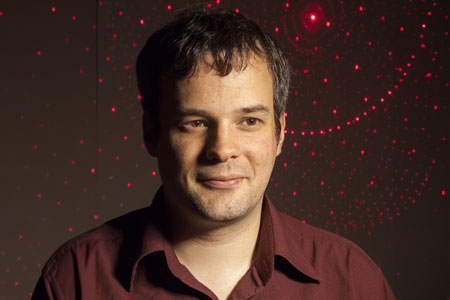| Meet the University of Wisconsin-Madison’s Andreas Velten Professor of Biostatistics & Medical Informatics |
 |
Research area The Computational Optics Group develops computational imaging systems for applications in biomedical imaging and remote sensing. Research focuses on developing ultrafast computational optics and imaging methods that extend human and machine vision quantitatively, by improving image parameters like resolution, and qualitatively, by developing new capabilities beyond what even the best possible traditional image could deliver. Velten is developing ultrafast computational cameras that can see around corners, through scattering media, and can detect cancerous tissue and evaluate plant health by detecting fluorescence lifetime.
What excites you about your work?
“It’s very interdisciplinary and has immediate applications. I feel like I’m mostly motivated by creating things. I always like figuring out how things work and using my knowledge to build something functional that can do things people couldn’t do before. That’s also where images are really powerful. The most exciting data, once you make an image or video out of it, is much easier to understand and clicks with people much better. Technology transfer fits into that–it’s a way of taking what we do here, licensing technology to a startup, and seeing them build something people can use.”
What do you hope to achieve?
“I feel like it’s more productive to keep my research open-ended, following my instincts and doing what I think is useful at the moment. I focus on the idea of creating new insight and knowledge people can use in the future to understand the world better.”
Andreas is a prolific researcher and inventor who is constantly on the cutting edge of what is possible. We are excited to partner with industry to commercialize these technologies.
– Michael Carey, WARF, Licensing Manager
Want to learn more?
Michael Carey, [email protected], 608.960.9867